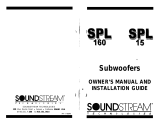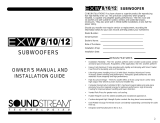Page is loading ...

8
SOUNDSTREAM TECHNOLOGIES
120 Blue Ravine Road • Folsom • California 95630 USA
tel 916.351.1288 fax 916.351.0414
(REV A, 3/31/98)
1
Subwoofer
OWNER'S MANUAL AND
INSTALLATION GUIDE

2
CONGRATULATIONS! You now own The Mule, a first-of-its-kind
subwoofer designed to reproduce extremely high levels of SPL at a point in the
spectrum where the resonance god lives. This precision component, when
properly installed, is capable of exciting the air in your vehicle to a level where
it can vibrate the metal skin of the car and shake your world.
Should your woofer ever require service or replacement, recording the
information below for your own records will help protect your investment.
Model Number:___________________________________________________________
Serial Number: ___________________________________________________________
Dealer’s Name: __________________________________________________________
Date of Purchase: ________________________________________________________
Installation Shop: _________________________________________________________
Installation Date: _________________________________________________________
DESIGN FEATURES
• New Custom Cone with Large Roll Polyether Surround provides longer excursion and
better control.
• New Revolutionary Computer Numerically Controlled (CNC) Machined Aluminum
Heat Sinks surround the voice coil and remove heat to vastly increase power handling.
• New Custom Non-Resonant Polypropylene Dust Dome for added structural rigidity
providing solid, well controlled performance.
• New Heavy Gauge Steel Silver Powder-Coated Basket provides extra rigidity and
damping.
• Ultra-High Power Handling 2½" Voice Coil with Kapton/Epoxy former increases
power handling and performance.
• Aerospace Grade Adhesives and Materials insure longevity and high performance.
• CNC Machined Magnet Plates and pole piece precisely focus the magnetic energy for
optimum performance.
• High Emissivity Coating on all metal plates improves power handling.
• Double Magnet Structure for increased linear strength and throw.
• Vented Pole Piece for greater voice coil cooling.
7
DESIGNATED ENCLOSURE
This is a unique subwoofer and it has been designed to operate at peak
efficiency only in the enclosure shown below. Installing it in other
50
55
60
65
70
75
80
85
90
95
10 100 1000
Frequency Hz
dB
Two frequency response curves are shown for this design, one for predicted
“In-Car” response and the other for “Half-Space Anechoic” (out-of-car)
response. The performance difference between the two curves is a result of
the natural acoustics of an “average” automotive environment. This “average”
transfer function is only an approximation of what you may expect to see in
your car. Every car is different.
The curves were generated using 2.83 Volts and measured at 1 meter. Also,
each frequency response curve includes a 12 dB/octave low pass filter at 100
Hz.
.875 cu. ft. o.d.
12.00"
13.50"
1
2
.
0
0
"
1
3
.
5
0
"
10.50"
12.00"
.745 cu. ft. = 1287.0 cu. in.
woofer + 225.0 cu. in.
____________________________________________________
.875 cu. ft. gross = 1512.0 cu. in.
Application Notes:
____________________________
____________________________
____________________________
____________________________
____________________________
____________________________
____________________________
R & D Loudspeaker Performance Projection
SPL vs. Frequency (2.83 volts input / 1 meter)

6
Measure maximum possible dimensions
Multiply wall thickness by 2
Subtract this from each dimension to
arrive at Gross Internal Dimensions
Multiply LxWxD to arrive at
Gross Internal Volume
Deduct Vf (volume of the speaker frame)
from Gross Internal Volume
Braces?
No Yes
Calculate brace volume and deduct
from Gross Internal Volume
Deduct Vf (volume of the speaker frame)
from Gross Internal Volume
You are at Net Internal Volume
in cubic inches (in )
3
To convert to LITERS:
Divide in by 61.03
To convert to CUBIC FEET:
Divide in by 1728
3
3
ENCLOSURE VOLUME FLOWCHART
3
CAVITY RESONANCE TUNING AND POWER HANDLING IN THE MULE
One of the unique features designed into the SPL Mule is an ability to play
extremely loud when installed in a typical vehicle. Its peak output frequency
and Q (Quality Factor) are targeted toward the “Cavity Resonance” of a car’s
passenger compartment.
Resonance occurs when a body (e.g., an enclosed volume of air) capable of
producing sound receives impulses at one of its fundamental or harmonic
frequencies. If, for example, a car has a fundamental resonance of 65Hz, a
loudspeaker with high output at that frequency will excite the metal at the
resonance and produce sound in addition to the speaker.
Another Mule design feature is improved heat transfer. Aluminum heat sinks
and steel plates with high emissivity coatings extract heat from the voice coil.
By providing a path for heat in the voice coil, we not only allow it to accept
more wattage but also reduce its electrical resistance and allow higher current
flow. The effect is higher power handling and more output.
The Mule is also designed to operated effectively in a small enclosure. An
example would be an installation of 16 Mule drivers which could be
accomplished within a space just a bit larger than 4ft by 4ft by 1ft deep!
16 Mules would produce tremendous output. Since sound pressure level
increases by 6dB every time you double the number of drivers, the system
would produce 24dB more output than a single Mule at the same power/
Wall of Mules:
Each individual enclosure
measures 12” W x 12” H x 10½” D
inside for a net internal volume
of .745 ft
3
.
External dimensions of the multiple
driver enclosure are 51¾” W x 51¾”H
x 12”D
5
1
3
/
4
"
51 3/4"

4
Frequency Response (Hz)
25-400
Sensitivity (2.83v/1m)
92 dB
Impedance (nominal Z, ohms)
4
Rated Program Power, Watts
500
Fs (Hz)
26.8
Qts
.85
Qms
10.6
Qes
.92
Efficiency Bandwidth Product (Fs/Qes)
29.1
Vas (ft
3
)
3.32
Vas (liters)
94.1
Vas (m
3
)
.094
Cms (um/N)
298
DCR (ohms)
3.64
Levc (mH) @ 1 KHz
1.35
BL (Tesla m)
9.49
Sd (in
2
)
73.0
Sd (m
2
)
.047
Sd (cm
2
)
471
X max; one way (linear mm)
11.0
X max; one way (peak mm)
28.7
Vd (linear cm
3
)
518
Vd (peak cm
3
)
1352
Vd (linear m
3
)
0.000518
Vd (peak m
3
)
0.001352
Mms (grams)
118
Magnet Assembly (oz)
256
Magnet Weight (oz)
104
Vf (volume of frame, in
3
)
225
SPECIFICATIONS &
THIELE/SMALL PARAMETERS
5
BUILDING THE ENCLOSURE
This owner's manual contains an enclosure for your subwoofer. The following
are general procedures to follow to build this enclosure:
• Determine the dimensions of your enclosure.
• Be certain the box you have designed will fit into the location you have
chosen. Sometimes making a cardboard box with the same outside
dimensions is helpful.
• Use 3/4 inch thick Medium Density Fiberboard (MDF) or High Density
Particleboard. It is preferable to cut the wood with a table saw to ensure
straight, even joints. If a table saw is not available, a circular saw is
acceptable.
• Use a “T” square to verify precise right angle gluing.
• Use a high quality wood glue and air nails or wood screws to assemble the
enclosure. Elmer’s woodworker’s glue and Weldwood work well. To
guarantee an airtight box, seal each inside joint with silicone sealant.
• Stuff the chamber with 50-75% filling (approximately 1.5 pounds per cubic
foot) of fiberglass insulation or Dacron.
• Use the supplied gasket to seal the woofer in the enclosure and eight (8)
wood screws or T-nuts and bolts. Progressively tighten each of the bolts or
screws to prevent warping the woofer frame.
• Use slide-on connectors to attach speaker wires. DO NOT solder wires to
the provided terminals as this may cause damage to the factory wire
connection. This may also void the speaker’s warranty.
CALCULATING NET INTERNAL ENCLOSURE VOLUMES
When constructing any type of enclosure, you must be aware that the
outside dimensions DO NOT represent the true (net) volume inside.
Such things as woofers, thickness of enclosure material, dividing walls,
and any internal bracing will reduce the total amount of the actual air
space available. The following worksheet has been designed to
provide you with the necessary steps to accurately calculate the net
internal volume of any given enclosure.
/




